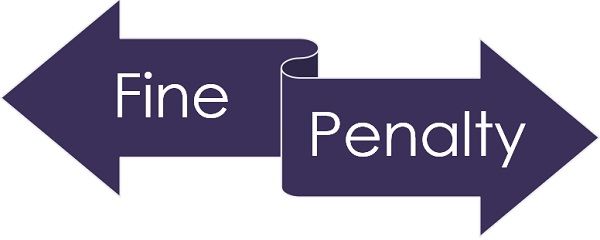 Fine is referred to as a sum of money ordered by the court to pay for an offence, after the complete prosecution in a matter. On the other hand, penalties do not involve court proceedings and they are imposed when a person does not comply with the provision of a specified act.
Fine is referred to as a sum of money ordered by the court to pay for an offence, after the complete prosecution in a matter. On the other hand, penalties do not involve court proceedings and they are imposed when a person does not comply with the provision of a specified act.
Punishment is a term mainly used in the socio-legal context, as it derives its goals from sociological outlook, and at the same time, it obtains its understanding and enforceability through a legal structure. There are different forms of punishment such as simple or rigorous imprisonment, life imprisonment, death, fine, and property forfeiture.
There are instances when people juxtapose fine for a penalty, but they are two different terms. So, here we will discuss all the differences between fine and penalty.
Content: Fine Vs Penalty
Comparison Chart
| Basis for Comparison | Fine | Penalty |
|---|---|---|
| Meaning | A fine is levied on a person as a punishment for wrongdoing. | A penalty is levied when a person is supposed to perform or not to perform a specific act. |
| Imposed for | Crime or offence | Breaking laws or rules |
| Form of punishment | Monetary payment which is imposed along with trials, community service and imprisonment. | Payment for damages, loss of legal rights relating to property and even imprisonment. |
| Imposed by | Court | Appropriate Authority |
Definition of Fine
Fine is a form of punishment used in different aspects of the law such as civil law or criminal law, whose goal is decided on the basis of nature of the offence. It is an amount which by order of the judge has to be paid for the punishment of the offender.
It is a pecuniary punishment inflicted by the judgement of competent jurisdiction, upon a person convicted of a crime. This means that once a person is convicted of a crime, the sentencing judge as per his own discretion imposes a criminal fine on the convicted party. It can also take the form of prison sentence or probation.
There are a number of factors considered while deciding the fine, these are – a type of crime, severity, circumstances, the criminal record of the defendant, the testimony of the convicted defendant’s loved ones, measures taken by the defendant for correcting the mistake.
In short, fine is the price which a person pays for certain behaviour. It is a monetary sanction which acts as a key punishment in civil law. The sum shows the severity of a breach of contract or offence, which is decided by the court.
The imposition of a fine in civil cases is to compensate, whereas, in the case of criminal cases, the aim is to punish.
With respect to companies, fine is imposed if any application or petition is filed with the court such as National Company Law Tribunal, High Court, etc.
It is considered as an ideal penal measure because it is capable of presenting different degrees of severity and liability. It should be flexible so that it can be adjusted as per the rigorousness of the offence.
Definition of Penalty
Penalty refers to a punitive measure which is imposed by law for undertaking an act which is forbidden or failing to perform a statutorily required act. It can take the form of imprisonment or fine. The word ‘penalty’ is derived from the word ‘penal’ which describes the punishment for correcting the action of the wrongdoer under a legal system
Simply put, a penalty as a predetermined amount for the nonpayment or nonperformance of an act within the prescribed time.
The penalty is concerned with the violation of standard conduct, with respect to specific obligation. It is like a price tag attached to a specific noncompliant behaviour, paid by those who adopt such behaviour. It is a basic punishment imposed for doing something which violates the law.
With respect to companies, penalties are imposed on the event of non-compliance and the relevant authority can directly impose the penalty.
In the context of criminal cases, the criminal penalty is imposed. The criminal penalty is in the form of a monetary fine, criminal sentence, or forfeiting the property of the person violating the law as ordered by the court after the conviction of a crime, which can be any action, omission or violation.
Key Differences Between Fine and Penalty
The differences between fine and penalty can be drawn clearly on the following grounds:
- Fine refers to a sum of money, which the court orders to pay as a penalty or punishment. On the contrary, the penalty is retribution inflicted on someone for the not complying with the provisions of a certain act.
- While a fine is imposed on the commission of a crime or offence, the penalty is imposed for breaking a certain, law, rule or contract.
- Fine covers monetary payment which is inflicted along with trials, community service and imprisonment. As against, the penalty is in the form of payment for damages, forfeiture of property and even imprisonment.
- Fine is imposed by the court on the wrongdoer, whereas the penalty is imposed by the relevant authority on the person who violates the law.
Conclusion
By and large, fine is also a type of penalty and both have civil and criminal applicability. Fines posses the power of holding deterrence, compensatory and other purposes, for which punishment is imposed on someone. On the other hand, penalties are a great way of preventing the breach of the law, contract or rule, as the person has to pay for intervening the law.






Leave a Reply